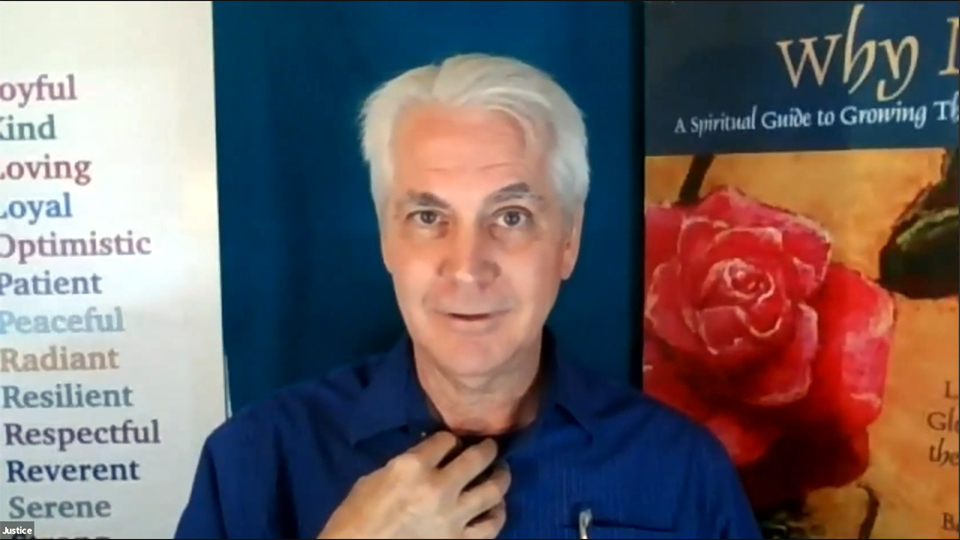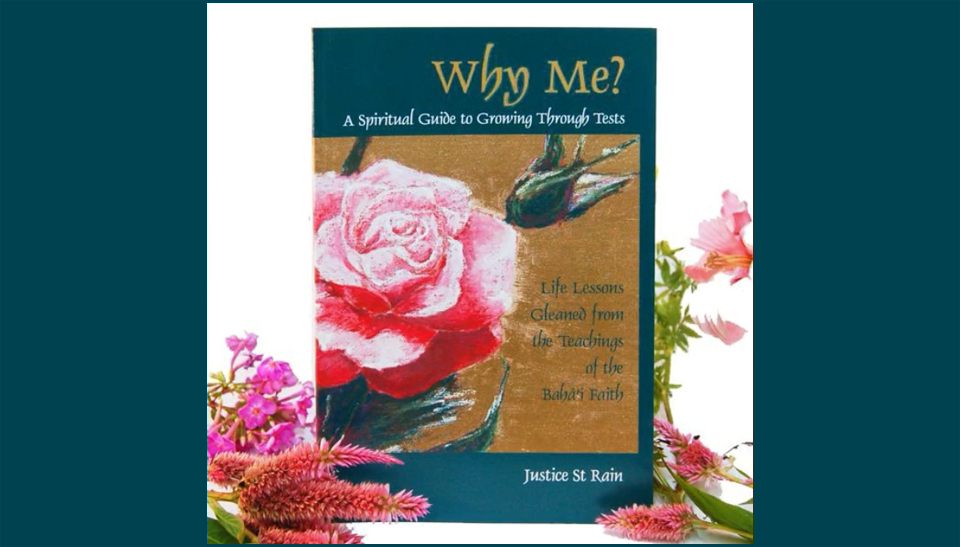|
 December
12, 2021
December
12, 2021
What Roses Know: Troubles and Growth
O
SON OF MAN! My calamity is My providence,
outwardly it is fire and
vengeance, but inwardly it is light and mercy. Hasten thereunto that
thou mayest become an eternal light and an immortal
spirit. This is My
command unto thee, do thou observe it.
— Bahá’u’lláh (The Hidden Words, Arabic no. 51)
 Once upon a time, there were four rose bushes…
In Why
Me? A Spiritual Guide to Growing Through Tests, American
Bahá'í author Justice St. Rain uses a fable to illustrate four
responses to the hardships of life. After a summer nourishing their
growth, a gardener aggressively prunes four rose bushes. St. Rain
imagines, for each plant, typical human responses to such an unforeseen
“tragedy”. Why Me? is among the most popular of his
ten books, and his fall 2021 talk in the ongoing “Big
Ideas
” series for an online audience of over 120, condenses that book’s
arguments.
Once upon a time, there were four rose bushes…
In Why
Me? A Spiritual Guide to Growing Through Tests, American
Bahá'í author Justice St. Rain uses a fable to illustrate four
responses to the hardships of life. After a summer nourishing their
growth, a gardener aggressively prunes four rose bushes. St. Rain
imagines, for each plant, typical human responses to such an unforeseen
“tragedy”. Why Me? is among the most popular of his
ten books, and his fall 2021 talk in the ongoing “Big
Ideas
” series for an online audience of over 120, condenses that book’s
arguments.
The first bush was
outraged. “Oh, my gardener!” she
shouted. “How can you do this to me?” Defiantly, the rose bush resolved
never to produce beautiful flowers again. Rebellion in the face of
suffering, though, only worsened the bush’s condition.
The second plant, ashamed, decided her extravagant growth had somehow
offended the gardener, and avoided future pain by restraining the
impulse to flower.
“Who said life is fair?” snorted the third, a cynic. “This makes no
sense. Accept fate and move on.” She returned, the following year, to
growing the same long branches with occasional blooms.
The fourth plant did better. “Hmm. Last summer I grew branches and some
pretty flowers. I trust the gardener, who has always cared for me. So,
what can I learn from this?” She noticed many nodes along her trimmed
branches. She realized she could bloom in multiple new directions.
“What a gift the gardener has given me!”
Justice St. Rain draws three lessons from this story. First, “tests
invite us to trust the loving hand of our Creator.” Neither rebellion,
shame, nor a jaded fatalism allow us to thrive. The fourth rosebush
believed in purpose, trusted a higher intelligence, sought
understanding and discovered opportunity. Humans, too, can regard the
inevitable difficulties of our physical lives as occasions of grace.

The Hidden Words of Bahá’u’lláh – potent
restatements of age-old wisdom by the Author of the Bahá'í teachings –
advise us to “hasten” towards “calamity”. Far from self-destruction,
this attitude recognizes that what seems like “fire and vengeance” is
actually the “light and mercy” of becoming our best selves. Instructive
failures lead entrepreneurs to greater success; athletes embrace
painful training. But beyond these truisms, our higher purposes are
mainly spiritual.
“Thou hast created me to know Thee and to worship Thee”: this daily
prayer centres our life’s purpose in developing capacity to love and to
know. ‘Abdu’l- Bahá, Bahá’u’lláh’s son and exemplar, emphasized that we
can only know and love God via what that unknowable Creator has made –
including ourselves. We should cultivate the virtues latent within us –
forbearance, kindness, perceptiveness, courage – which is St. Rain’s
second lesson of the roses: growth comes from self-discovery. And how
can we discover our capacity unless it is challenged?
St. Rain compared our growth to the “levelling up” of a video-game
player, overcoming obstacles to hone sharper skills. At the most
advanced level of human growth, we undertake it for its intrinsic
value, for God’s sake:
“That
which is worthy of His Essence is to worship Him
for His sake, without fear of fire, or hope of paradise.”
The
Báb, in The Persian Bayán
The Báb (“Gate”), the forerunner to Bahá’u’láh, invited humanity to
move beyond after-life punishments and rewards as our chief motivators.
Bahá’u’lláh elaborated that, if we are inspired by the love of God to
build inner strengths, “all the world’s afflictions can in no wise
alarm” us. He promises that God “will never deal unjustly with anyone,
neither will He task a soul beyond its power.” For Justice St. Rain,
this has a clear implication: God doesn’t punish us. That doesn’t mean
there won’t be tests! (Many of our challenges are self-inflicted, in
any case.)
The roses’ third lesson is that growth requires committed effort.
Failures to grow mean that life lessons – “pruning” – will continue
until we develop the wisdom, strength or patience to overcome them. In
another of His Hidden Words, Bahá’u’lláh says:
My
first counsel is this: Possess a pure, kindly and radiant heart, that
thine may be a sovereignty ancient, imperishable and everlasting.
This “sovereignty”, St. Rain argues, consists in being in command of
oneself. Virtuous thought and action steadily take us beyond the power
of the world to enslave or intimidate us, to make us hateful, ashamed,
or apathetic. And when we play our thoughtful part, he concluded, we
trust the gardener. “God is always on our side, always, always, always!”
|
|


